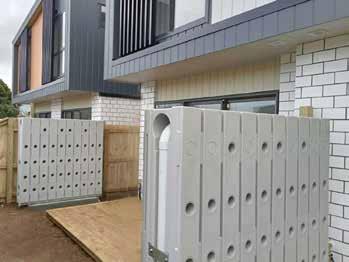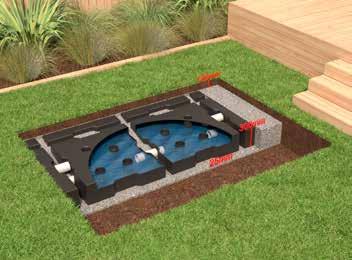
3 minute read
NZ Plumber October-November 2023
TANKS FOR TIGHT SPACES
Advice from Watersmart on selecting the right tank solution to manage stormwater and rainwater in our increasingly crowded cities.
AUTHOR: WATERSMART
As our cities become denser and consents for multi-unit homes exceed those for standalone houses, Watersmart is helping installers identify options to maximise household water storage when space is at a premium.

When it comes to water, we are going through a time of feast or famine. A few years ago, we had drought—Auckland was on water restrictions. Now we have seen flooding beyond what we could ever imagine, and yet El Niño promises long, hot, dry summers. This has made us look at how we manage stormwater and reduce water consumption. As we cover up more permeable spaces like lawns with hard surfaces, we must offset this with localised tanks to manage stormwater run-off and reduce the risk of flooding.
Selecting a water tank in an urban space
Civil engineers look at site coverage and then design solutions to attenuate stormwater outflow. At this point there are three core questions:
1. What are we required to attenuate—rooftops, ground run-off, or both? Options include managing rooftops separately with a local on-lot water tank, and a separate tank to manage ground run-off, usually in the shared driveway, or to combine them.
2. What distance will the furthest tank be from the location of discharge? Do we have sufficient fall to install the selected solution? The site may require thrusting costly new stormwater connection metres down a road to meet the invert, so options could include an above-ground and almost invisible FenceTank and/or a low-profile Aquacomb tank hidden in slabs, driveways or decks to increase the ability of achieving fall to the invert level.
3. How much space do you have? With urban density we don’t have the same space as we used to, so we need to consider what tank can fit. This involves asking: Below ground, what is the distance from the slab, and how far is a buried tank from a retaining wall? Above ground, can a standard round water tank fit? On smaller sites this is unlikely, so a slimline above-ground tank can be installed against a fence, house, or at the back of a carport.
When it comes to installation
Watersmart want to add value to the NZ plumbing industry, so can either work for you with a team of trained technicians or train you to educate your team through Watersmart’s Aquacomb/FT/ Pump approved installer programme. Installation guides are also available to make life easy for installers, and life can be made easier still with pre-fabricating kits for Watersmart solutions and plug-and-play fully pre-assembled and tested pumps.
Minimising the need to clean tanks
The goal is to ensure the removal of as much organic matter as possible, reducing the potential of it entering the tank itself. When storing non-potable water, the use of pre-filter devices like a leaf diverter will assist in reducing the requirement of cleaning the tank itself.
ABOUT WATERSMART: Established in 2017, Watersmart helps Kiwis to realise the true value of water, as an on-site water management solutions specialist. Watersmart manufacture, supply, install and service systems that help councils, companies, households and installers retain, detain, reuse, recycle and protect water. https://watersmart.co.nz/contact

FenceTank offers a rainwater storage solution where space is at a premium.
Aquacomb tanks can be hidden in slabs, driveways or decks for an invisible water storage solution.










